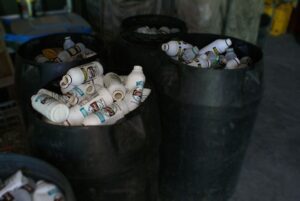People have long been advised to empty and flatten plastic water bottles before recycling them, but this practice may no longer be necessary and could even do more damage than good.
Plastic pollution fills landfills and the oceans with life-killing waste, but we can mitigate its harmful impact by upgrading bottle deposit systems and increasing recycling rates to decrease plastic waste production.
Less Waste
 Reducing waste is one of the bottle recycling benefits Adelaide. Every time you recycle one, you are saving both natural resources and energy that would have gone toward creating new bottles from scratch. Producing one using recycled material requires about two-thirds less energy to manufacture, helping ease strain on traditional power grids that depend on fossil fuel burning for power production.
Reducing waste is one of the bottle recycling benefits Adelaide. Every time you recycle one, you are saving both natural resources and energy that would have gone toward creating new bottles from scratch. Producing one using recycled material requires about two-thirds less energy to manufacture, helping ease strain on traditional power grids that depend on fossil fuel burning for power production.
Recycling plastic water bottles is another benefit that reduces pollution. Producing them requires much energy, producing greenhouse gases that contribute to climate change. Recycling them reduces pollution in the environment – specifically in places like the Great Pacific Garbage Patch where marine animals mistake it for food sources.
Plastic bottles are among the most frequently found items floating in ocean waters and pose a health threat to marine wildlife. By recycling them, you can help ensure they don’t end up polluting our environment or harming natural resources – plus recycling provides jobs in this sector – for every job created in waste management, four are created in recycling.
Less Energy
If you have been recycling for some time, you may recall being instructed to separate bottle caps from water bottles and flatten them before placing them in your recycling bin. At one point in time, this process was necessary because processing equipment couldn’t accommodate both caps and bottles at the same time; however, such advice no longer makes sense.
Keep the cap on when bottle recycling benefits Adelaide as this will reduce energy use in processing them – less plastic needs to be melted down and processed means fewer fossil fuels need be burned for processing!
Many of the world’s best-selling water and pop bottles are constructed from polyethylene terephthalate (PET), an energy efficient plastic that can be recycled again and again to save costs on energy usage. Large beverage companies have set minimum recycled content goals for their products as well as goals to use recycled materials in packaging for each one of them.
Other plastics used for detergent jugs and peanut butter jars degrade over time during recycling cycles, only being recyclable once or twice before their resilience is depleted – one of the major benefits of recycling PET is that its resilience means it always has another life ahead of it!
Less Pollution
Plastic water bottles and other forms of trash end up in our oceans, creating an environmental hazard and endangering marine life. Fish mistake them for food sources and they become a major pollutant on beaches and roadways. By recycling, we can cut back on this debris while helping safeguard our planet.
Plastic that’s not recycled ends up in landfills for years, contributing greenhouse gasses and taking up valuable space. Reusing one pound of polyethylene terephthalate plastic (PET), commonly found in water bottles and soft drinks containers, saves roughly 12,000 BTUs of energy – drastically cutting waste while helping the planet.
When you place bottles into your blue recycling bin, they’re taken to a facility for sorting and processing, where they are then ground into flakes and melted down to pellets about the size of rice – ready for sale to companies making plastic toys, tools and electronics products from them.
Bottle recycling benefits Adelaide requires less energy and fossil fuels than manufacturing new plastic from raw materials, which makes the process environmentally friendly. Unfortunately, recycled pellets or flakes don’t always come out with as high-quality results compared to virgin plastics; many times, recycled material must be reformed into virgin material in order to maintain quality standards.
Less Money
Recycled plastic bottles provide numerous environmental and financial benefits, including less pollution and waste sent to landfills. Recycling uses significantly less energy than producing new ones, helping relieve pressure from traditional power sources like fossil fuels.
Recycling bottles also saves companies money; according to one recent study, water and soda manufacturers made more profit selling refillable and reusable bottles than single-use ones.
One of the primary advantages of bottle recycling is that it helps decrease the number of plastic bottles ending up in our oceans, which have a devastating impact on all life that lives there. Fish and birds ingest plastic waste or become entangled in it; trash may suffocate wildlife as well. Plastic bottles also damage ocean and roadway surfaces – costing local governments millions to clean up after being dropped off by ship or floating downriver on river boats.
Reducing plastic bottle waste in our oceans is achievable through simple measures, like encouraging businesses to use reusable bottles or supporting local initiatives like bottle bills. Bottle bills have proven their efficacy at both reducing litter and saving cities and states money by incentivising people to return empty bottles for a deposit refund; however, beverage and plastics companies have long opposed such legislation, which explains why Hardegree’s plan may fail.
